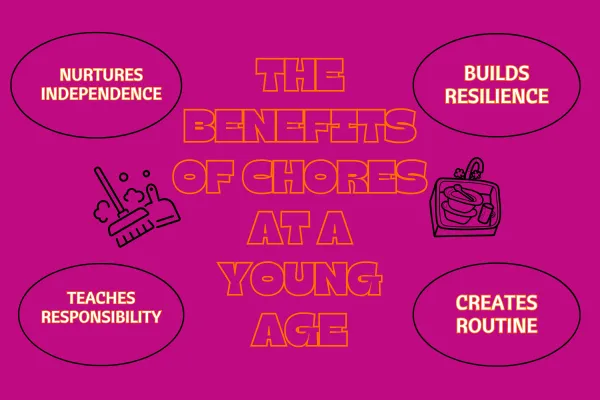
Raising Helpers Around The House
Raising Helpers: How Chores Build Resilience in Young Children
If you've ever watched your toddler gleefully throw toys into a basket or help you wipe the counter with more enthusiasm than effectiveness, you're witnessing something deeply valuable: the building blocks of resilience.
In a charming and educational video from the Mata the Brown Bear series, B (the narrator) introduces young children to the concept of helping through chores. With support from characters like Mr. Butterfly and the "idea train," the episode walks children through five simple tasks: picking up laundry, cleaning toys, throwing away trash, raking leaves, and setting the dinner table.
“A chore is a job that you can do to help out,” B explains gently. Throughout the video, Mata receives a purple star each time a task is completed—offering both visual feedback and emotional encouragement.
At Wild Wonders Daycare, we love this kind of content because it encourages what we value most: nurturing independence, responsibility, and the joy of contribution in even the youngest learners.
Why Chores Matter for Resilience
Chores aren’t just about clean rooms or tidy tables. When done well—meaning with support, choice, and a sense of purpose—chores give children a healthy sense of:
Agency: “I can make a difference.”
Routine: “I know what to expect.”
Belonging: “My help matters to my family.”
These are the same foundational beliefs that make children more resilient in the face of setbacks, changes in routine, or big transitions like starting preschool or daycare.
3 Ways to Use Chores to Build Emotional Strength
If you're inspired by Mata’s chore list (and those purple star stickers!), here are three ways you can bring that same energy into your home:
1. Create a Visual Chore Chart
Children aged 2–5 benefit from pictures more than words. Use simple illustrations or photos of tasks your child can complete, just like Mata’s list. Include only a few tasks at a time to keep it achievable. Reward completion with something symbolic like a sticker, star, or high-five.
2. Turn Chores Into Connection Moments
Rather than sending your child off to clean up alone, do chores together. Narrate the process, offer praise, and keep the tone playful. When B asks Mata, “Do you think your dirty clothes belong on the ground?” it’s not accusatory—it’s invitational.
3. Celebrate Effort, Not Perfection
Your child won’t fold towels the “right” way, and that’s okay. What matters more is the effort and identity you’re reinforcing: You are someone who helps. You are capable. Over time, this message becomes an internal compass for self-worth and contribution.
Final Thought
Children crave opportunities to contribute. When we give them the tools, time, and trust to do so, we’re not just raising helpful kids—we're raising resilient, confident people.


